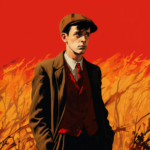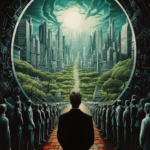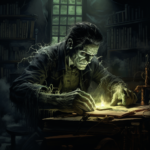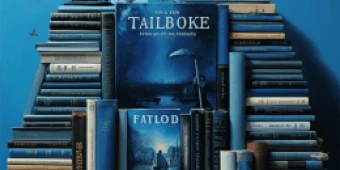Top 10 Classic Books to Write About


To Kill a Mockingbird
by Harper Lee
DescriptionStudents should write an essay on “To Kill a Mockingbird” because it offers a rich tapestry of themes and social issues that remain relevant today. Harper Lee’s novel explores concepts of justice, racial prejudice, empathy, and the moral growth of its characters. Analyzing and discussing these elements through writing helps students develop critical thinking skills, enhances their understanding of historical and contemporary social issues, and encourages them to empathize with different perspectives. Additionally, “To Kill a Mockingbird” is a classic of American literature, making it an essential literary work for students to engage with and reflect upon in their academic journey.
Essay Samples on Lessons in To Kill A Mockingbird
To Kill A Mockingbird - Questions & Answers
Recommended for You

1984
by George Orwell
Description“1984” serves as a cautionary tale about the dangers of totalitarianism, surveillance, and the erosion of individual freedoms. Analyzing the themes, characters, and societal structures depicted in the book not only enhances critical thinking and literary analysis skills but also encourages students to reflect on the importance of safeguarding democracy and personal liberties in our own world. “1984” remains a thought-provoking and relevant work that prompts important discussions about power, control, and the consequences of mass manipulation, making it a valuable text for students to explore and discuss in essays and classroom discussions.
1984 Compared to Today Essay Samples
The Use of Language in 1984

Pride and Prejudice
by Jane Austen
DescriptionJane Austen’s novel is a timeless classic that offers profound insights into human nature, society, and the complexities of relationships. Through the characters of Elizabeth Bennet and Mr. Darcy, it explores themes of love, class, reputation, and personal growth. Crafting an essay on this novel encourages students to analyze Austen’s keen social commentary, her wit, and her portrayal of the societal norms and constraints of the early 19th century. Moreover, the themes of prejudice and the evolution of one’s character are still relevant today, fostering discussions about personal biases and the importance of self-awareness. “Pride and Prejudice” is not only a literary masterpiece but also a source of valuable lessons and insights for students to explore in their essays.
- Feminist Satire in "Pride and Prejudice"
- "Pride and Prejudice" Book Review
- The Role of Money in "Pride and Prejudice"
- Darcy’s Letter to Elizabeth Analysis
Pride and Prejudice Essay Samples
Pride and Prejudice - Q&A

The Catcher in the Rye
by J.D. Salinger
DescriptionConsider writing an essay on “The Catcher in the Rye” due to its enduring relevance in exploring the complexities of human nature and the turbulent journey of self-discovery. Through the lens of Holden Caulfield, the novel examines themes such as the loss of innocence, the struggles of adolescence, and the universal desire for authenticity in a conformist world. Crafting an essay on this literary classic encourages students to delve into character analysis, narrative techniques, and the impact of setting on the story’s tone. Additionally, it fosters discussions about the role of literature in addressing mental health issues and the importance of empathy and understanding in our interactions with others. “The Catcher in the Rye” offers students a unique opportunity to engage with a timeless narrative that sparks introspection and critical thinking.
- The Theme of Socioeconomic Class in "The Catcher in the Rye"
- Relationship and Distance Treat in "The Catcher in The Rye"
- The Emotional Breakdown of Holden Caulfield
- Holden’s Immaturity At The Beginning And At The End Of The Book
The Catcher in the Rye Essay Topics
The Catcher in the Rye Q&A

Brave New World
by Aldous Huxley
DescriptionWriting an essay on “Brave New World” can help students get a unique opportunity to explore a dystopian future where individuality is sacrificed for societal stability and pleasure. Aldous Huxley’s novel delves into themes such as the dehumanizing effects of technology, the ethical implications of genetic engineering, and the pursuit of happiness at the cost of personal freedom. Crafting an essay on this work encourages critical analysis of the characters’ choices and societal norms, sparking discussions about the balance between personal freedom and collective well-being. “Brave New World” remains a thought-provoking and relevant text, making it an ideal subject for students to explore in their essays, prompting them to reflect on our own society’s trajectory and the potential consequences of unchecked technological advancement.
Brave New World Themes Essay Samples

Moby Dick
by Herman Melville
DescriptionMoby Dick is a literary masterpiece that offers a rich and multifaceted exploration of themes such as obsession, revenge, the human condition, and the inexorable forces of nature. Crafting an essay on this work not only encourages deep character analysis of Captain Ahab, Ishmael, and the enigmatic White Whale but also prompts reflection on symbolism and allegory within the story. Moreover, “Moby-Dick” provides an opportunity to discuss the intricacies of narrative style, such as the blending of fact and fiction, and the novel’s enduring impact on American literature. Beyond its literary merits, this classic tale of adventure and existential inquiry challenges students to grapple with profound philosophical questions, making it a rewarding subject for essays that foster critical thinking and exploration of the human experience.
Analysis of Symbolism in Moby Dick

Heart of Darkness
by Joseph Conrad
Description“Heart of Darkness” is a profound exploration of complex themes such as imperialism, the human capacity for evil, and the effects of colonization on both the colonizers and the colonized. Analyzing this novel allows students to delve into the intricate narrative structure, symbolism, and character development, fostering critical thinking and literary analysis skills. Moreover, “Heart of Darkness” continues to be a relevant text in discussions of post-colonialism, cultural identity, and moral ambiguity, making it a valuable subject for contemporary literary exploration and reflection. Writing an essay on this classic work provides an opportunity for students to engage with timeless issues and sharpen their ability to articulate and defend their interpretations.
- Analysis of The Book "The Heart of Darkness"
- Female Characters in The Novel "Heart of Darkness"
- A Reflection on The Book Heart of Darkness
- Review on The Book "The Heart of Darkness"
Chinua Achebe "Heart of Darkness" Essay Samples
Essays on Main Themes in "The Heart of Darkness"

Frankenstein
by Mary Shelley
DescriptionReading and writing an essay on “Frankenstein” by Mary Shelley allows students to engage with a foundational work of Gothic and science fiction literature. Written during the Romantic era, this novel delves into profound questions concerning the boundaries of human ambition, the ethical implications of creation and science, and the complexities of identity and societal rejection. By exploring the tragic tale of Victor Frankenstein and his monstrous creation, students not only gain insight into the anxieties of Shelley’s time but also confront timeless dilemmas about humanity’s role in wielding power and knowledge. Crafting an essay on “Frankenstein” further sharpens analytical skills, encouraging students to think deeply about the novel’s multifaceted themes and their relevance in today’s technologically-driven world.
- The Consequences of Isolation and Alienation
- The Conflict Between The Creator and His Creation
- The Reasons Why The Monster Deserves Sympathy
- Victor Frankenstein's Selfishness as The Reason for His Downfall
- What Is One Overarching Topic Found In "Frankenstein"?
- Is The Novel "Frankenstein" Based On A True Story?
- What Natural Phenomena Influenced "Frankenstein"?
- What Does The Frankenstein Complex Mean?
Frankenstein Literary Essay Samples
Frankenstein - Q&A
Frankenstein Study Guides

The Odyssey
by Homer
DescriptionWriting an essay on “The Odyssey” offers students an opportunity to delve into one of the seminal works of Western literature, penned by the ancient Greek poet Homer. This epic tale, which narrates the adventures of Odysseus as he endeavors to return home from the Trojan War, is not just a story of heroism and adventure. It provides insights into ancient Greek values, the complexities of human nature, and the enduring themes of perseverance, loyalty, and the quest for identity. By analyzing “The Odyssey,” students can cultivate critical thinking skills, explore the rich tapestry of classical literature, and draw connections between ancient narratives and contemporary life, enriching their understanding of the human experience across time.
Main Themes in The Odyssey
Female Characters in Homer's Odyssey

The Great Gatsby
by F. Scott Fitzgerald
DescriptionF. Scott Fitzgerald’s classic novel delves into themes such as the American Dream, wealth, social class, and the illusion of success, providing ample material for critical analysis and discussion. Through crafting an essay on this iconic work, students can develop essential skills in literary analysis, critical thinking, and effective communication. Additionally, “The Great Gatsby” remains relevant in contemporary society, offering opportunities to reflect on timeless issues and their implications in our modern world. Writing an essay on this novel not only enhances students’ understanding of literature but also encourages them to engage with important societal questions.
- How Does Gatsby Represent The American Dream in "The Great Gatsby"
- Comparing "The Great Gatsby" and "Park Avenue": Money, Power, and American Dream
- Challenging the American Dream in "The Great Gatsby"
- "The Great Gatsby": Repeating the Past and American Dream
American Dream in "The Great Gatsby" - Essay Ideas
"The Great Gatsby" Study Guides

- Instructions Followed To The Letter
- Deadlines Met At Every Stage
- Unique And Plagiarism Free





